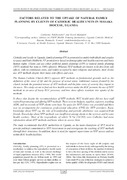| dc.description.abstract | Globally and locally in Uganda, family planning (FP) is promoted to enable individuals and couples
to space and limit childbirth. FP promotion is based on demographic and health concerns and basic
human rights. Clients can use either artificial family planning (AFP) or natural family planning
(NFP) methods but none is 100% effective. Whereas NFP methods are known to be free from side
effects, with no continuous costs, and widely accepted by most religions and cultures, most clients
use AFP methods despite their many side effects and costs.
The Roman Catholic Church (RCC) opposes AFP methods on fundamental grounds such as the
definition of the onset of life and the purpose of sexual union. Additional reasons fronted by the
church include the potential misuse of AFP methods and the false sense of security they impart to
the users. This study set out to find out how health services under the RCC promote the use of NFP
methods in an area of heavy RCC presence, and how these efforts translate into uptake of the
methods.
It shows that despite the recommendation of NFP methods, RCC health units did not have staff
trained in promoting and offering NFP methods. There were no budgets, supplies, registers, teaching
AIDS, and no records of NFP clients were kept. No space for NFP clinics was provided and there
was no arrangement for continuous professional education (CPE) for NFP providers. Basic
knowledge about NFP e.g. the role of breastfeeding and periodic abstinence was acquired from
friends. Knowledge about NFP methods was insufficient among clients to the services and in some
health workers. Most of the respondents, of which 76 %( 154/202) were Catholics had more
information about AFP methods and knew where to access them.
The study recommends that RCC authorities in Uganda, as the main champions of NFP, need to
provide political commitment to NFP, invest more in and reinvigorate the teaching of NFP methods
through their structures. In addition, there is need for support supervision on NFP access and use
within RCC health facilities. | en_US |


